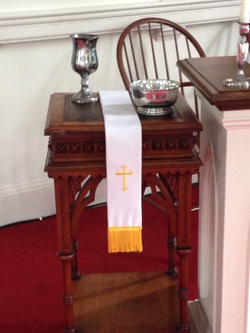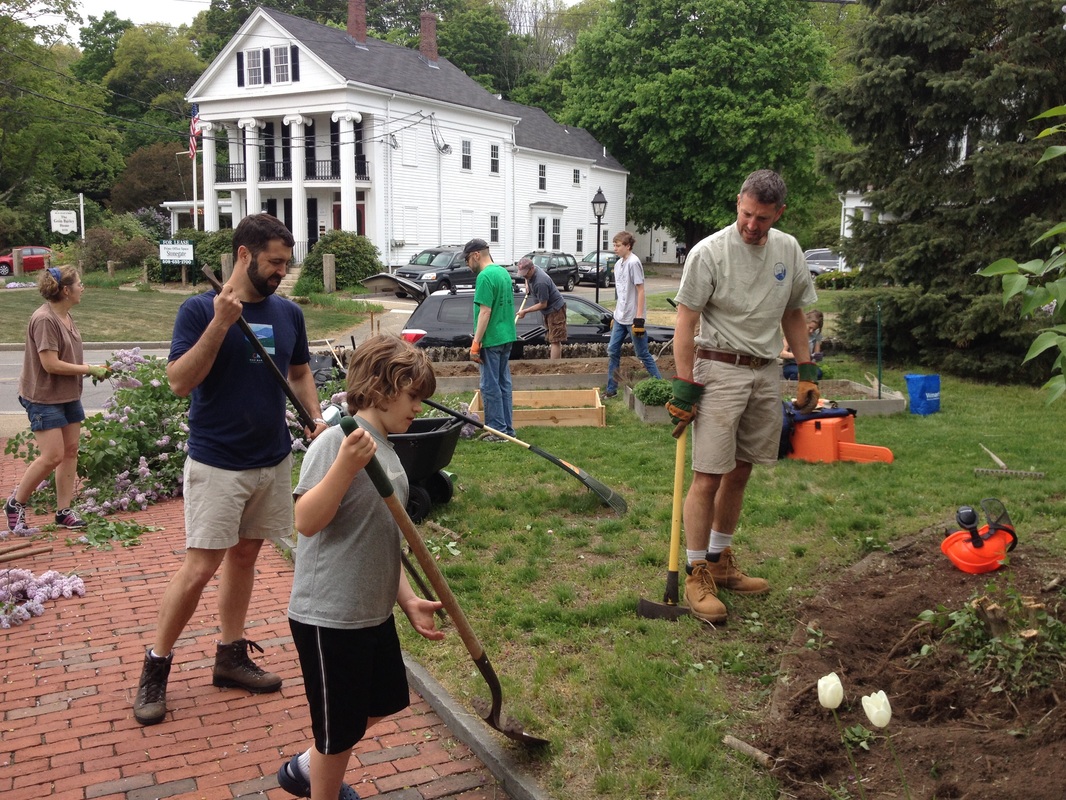|
I want to be clear. I chose a life in the church. When I was about 17, I became one of those kids that hangs around the margins of friendly youth groups. I would show up for pizza and movies. Sometimes, I might even go to worship. At that time my parents were not church people. They liked to sleep in and have brunch on Sundays. I went on my own.
There were many reasons for my decision. I was interested in issues of life and death that didn't seem to be addressed in other places. I was also a very political kid. In fact, I decide to become a minister at the 1988 Democratic Convention in Atlanta. I was a "page" for the Maine delegation (I wasn't old enough to vote ). However, I was also there as a volunteer for Jesse Jackson's presidential campaign. It was my time with that campaign ---staying up late with a combination of labor organizers and pastors ---that helped me find a different path from the political system I had become disillusioned with. That is when it finally occurred to me that I could find a way to combine my interest in spirituality with my interest in helping people. None of those folks I knew in Atlanta would remember me today but I am glad that I met them. The point is, I love the church. There have been times and contexts where I have found myself in a "poor fit". There are times when I have grown tired both as a layperson and as a pastor. This is natural. That said, I have made the church central to my existence. It is my job. The church houses, clothes, and feeds me...literally. When everyone else leaves, I am still there. It is also, in many respects, central to my social life. Outside of my family, the vast bulk of my friends are either clergy or clergy spouses. So it is no small thing to me when I see the changes happening in our congregations and institutions. You can count me in the front ranks of those who have a lot to lose. Like everyone, I see that most churches are shrinking. Some of them are closing. Supporting institutions like denominations/associations and seminaries are merging and sometimes vanishing as resources for survival become harder to find. Well-meaning church growth consultants will sell you recovery programs. The problem is that their success rate is hardly better than doing whatever you are doing now. Pub Theology isn't going to save us. Tweaking the liturgy isn't going to save us. Increasing or decreasing staffing isn't going to save us. Altering our programming isn't going to save us. At least not the "us" that we think of when we think of the traditional institutional church. Change is already here. It is inevitable that we greet this desperate situation with a certain amount of anxiety. This is simply because the change we see is also inevitable. There are too many forces at play to turn back the clock and expect that being the "best congregation or denomination ever" is going to bring people back in to worship every week. We are in the midst of watching something we love potentially die. It is as if we built sand castles on the beach expecting that the tide would never rise. Well now it has risen and it will continue to. Building a bigger moat will work about as well as it does on the beach. Our culture will not reverse itself. The institutions that we know and love will either fall into the sea or become something entirely different. We do no one any favors by pretending that this isn't happening. When we do, we all end up running around trying to fix it. Then, when we fail we label ourselves "failures". Perhaps we find others (denominational leaders, pastors, church moderators for example) to blame for a flood that has been centuries in the making. In any case, we mourn the loss and see it as final and tragic. None of this is a necessary response. What we should do is stop our whining and face the future with our heads high and our hearts open. That, of course, requires us to greet our situation using a different frame. Instead of anxiety, fear, and frustration as we watch the "old thing" fall away we need to turn to the "new thing" being born with a combination of hope, love, and excitement. It is exciting, you know. After centuries of doing roughly the same thing we have been chosen to reinvent how people do religion! Who wouldn't want to do that? I don't know about you but I believe in resurrection. I feel blessed to be able to witness at least the beginning of this one. The challenge ahead of us, frankly, is a big one. Those consultants I mentioned? They are doing their best but the fact is no one knows what is coming. They are showing us programs that worked somewhere else (we hope). They do not know our (or your) church. Each congregation and each religious organization has a part to play in this resurrection story. That part requires courage. There will be more failures in our future than victories. Yet, the victories will be greater than our failures. It means every leader of every committee in our committee-filled faith will have to expect that they will be sifting through the ruins of plans A, B, and C (at least) to find the small successes with which to build a new way of doing church. Every pastor will have to expect that the church they are building may be beyond their (our) skill set to lead. Denominations and Associations may have to face the fact that they are in the way rather than the way. Everything must be on the table. Why would we expect what comes next to be at all like what is here now? As you might have gathered, I am not planning to make any great system recommendations at this time (and possibly ever). Too much is in flux. What I would like to suggest, though, is that we practice changing our attitude. We need to be aware of our irrational concerns and to work to solve only the rational ones. We need to once again find joy in innovation. We need to cheer the heck up and open the windows. Throw things against the wall and see what sticks. Then clear out what falls and move on with more grist for the mill.. This is not a time for timidity. Church mice can hide and wring their hands. The rest of us cannot afford to. I chose a life in the church. I do not want the new church to be built by people with closed minds and hearts. I do not want to spend the rest of my life in an institution that is bitter, angry, and always looking back. I do not want to live in a church that is sincere but scared of the world around it. Can we prepare ourselves for the leap of faith? I hope so. I do not enjoy living in a world of infinite resignation.
0 Comments
Leave a Reply. |
Adam Tierney-EliotThis is my old weblog of many years. I will probably post here from time to time is there is a subject that does not fit WWG. However WWG is the more active page at this point. Archives
April 2022
Categories
All
|


 RSS Feed
RSS Feed